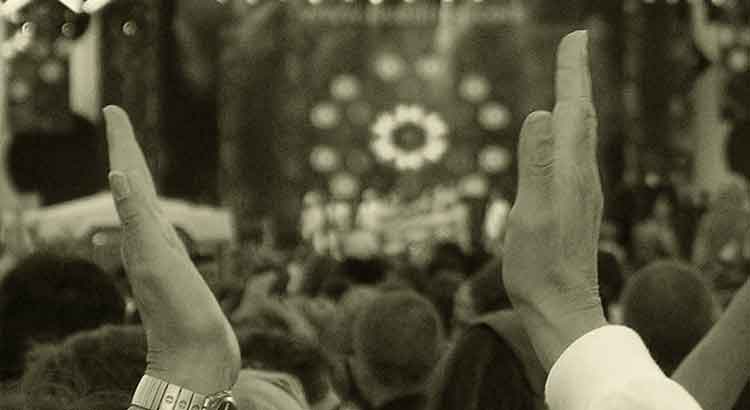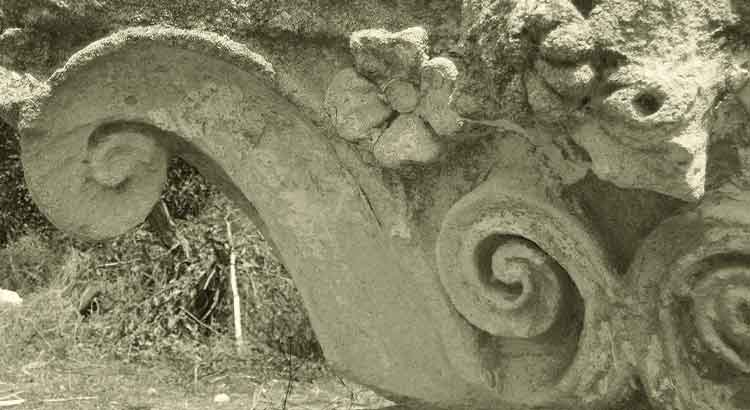A spectacular scene! I was standing in a line, waiting. The delay allowed me to notice a small television turned on at one end of the room. On it, a fashionable fellow dressed in a bright red jacket was holding a microphone and singing excitedly. I did not know him, nor could I hear him, since I had headphones on. But he was certainly one of the most famous singers of our time, because he sang on a sumptuous stage, backed by a huge band, with fifteen backing vocals correcting his voice. And there were many, many people in the audience. However, it was none of this that I noticed. What amused me was imagining that at any moment the women in the audience would throw their panties at the man, as they usually did a few decades ago. When the camera brought them into focus, the looks on their faces confessed that the moment was near. Then I began to notice that there was something strange about that show. That I did not know the artist was not strange: I would hardly be able to identify a single face among the ten best known these days. But something did not fit. It was not the red jacket, nor the showy hair… the keyboard player? Ah! so I understood! And it was not without astonishment that I distinguished, behind the stage, the details of the environment. They switched the shot and, from another angle, I was sure: the show was being performed in a church!
Tag: literature
Friday!
Something absolutely impossible for a man of other times would be to understand what goes on in the chest, veins, and mind of the overwhelming majority of modern men when the calendar declares it to be Friday. Friday! Wonderful Friday, when the sun rises and heralds the liberation of millions of souls! And modern man, bathed in this magnificent blessing, is overcome with an exhilarating and indescribable euphoria. Once a week he experiences an outpouring so strong that men of other times might go their whole lives without feeling anything like it. Tears, jubilation, screams, and gratitude to the heavens! Smiles on the face and the chest wanting to explode! On Thursday there is never any hope, it is as if the slave had already been working for long exhausting years, tired, unhappy, depressed, and aware that he would have to spend the rest of his mediocre and frustrating life this way. Then Friday! always unexpected Friday! the full proof that God exists and life is not so bad! There is no way that a man of other times would be able to understand it—and, probably, neither will those of the future, since the secular world no longer needs the luxury of a Christian calendar…
The Contrast Between Ancient and Modern Texts
It is amazing to note the contrast between ancient and modern texts. There is in the ancients an innocence—at least, this seems to us to be the right word—that causes us strangeness. We cannot understand them: there are texts that sound to us like they were written by children, or by beings from another race, inhabitants of another world. More: the ancients, for the most part, almost always sought to deal with the essential—something very rare in modern times, where literature is devoted to the trivial. The ancient texts are distinguished by the expression of an admiration, a reverence toward the reality that seems unimaginable to us. Modern man is devoid of the faculty of wonder: for him, existence is tedious and the world boring, old and banal.
The Best Narrative Requires Methodical Structuring
Various experiments have led me to think that the best narrative requires methodical structuring. It is true: one makes prose free-minded, letting it flow, with interesting results. Yet the effect of a narrative is almost always weaker if we notice major structural lapses in it. Why is it tepid? Why is it unconvincing? We often find the answer in its sequence, in the way it is organized and progresses. By the side of the artist, it seems interesting to sit down and build with total freedom, unattached to structural ties. However, there seems to be a lure there. Great art seems to require an omniscient artist who, at every step, strives to simulate the naturalness of what he is creating.



